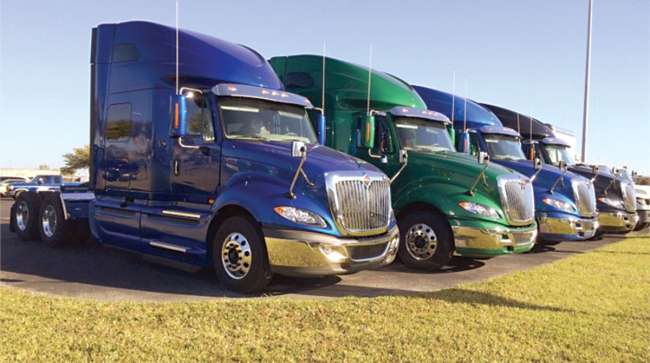The excise tax on a model year 2024 zero-emission truck costing as much as $435,000 can total more than $52,000. (Rechtien International Trucks)
A repeal of the 12% federal truck excise tax for new trucks would not only cut costs for truckers, it could benefit the environment and safety, according to new research by the American Transportation Research Institute.
The ATRI study said that the current 12% truck excise tax costs trucking companies more than $20,000 for a typical new Class 8 tractor. Depending on the truck and trailer type, the tax on a new tractor and semitrailer could well exceed $40,000, according to the study.
The excise tax on a model year 2024 zero-emission truck costing as much as $435,000 can total more than $52,000.
The present-day excise tax applies only to the first retail sale of new “truck, trailer and semitrailer chassis and bodies, and tractors” that meet certain size and use criteria.
Law Proposed in 2023
There has been renewed interest in eliminating the tax. The Modern, Clean and Safe Trucks Act is intended to repeal the excise tax, which dates to World War I. It was first introduced by Sens. Todd Young (R-Ind.) and Ben Cardin (D-Md.) in March 2023. Rep. Doug LaMalfa (R-Calif.), a senior member of the Transportation and Infrastructure Committee, took up efforts to eliminate the levy this past March 27.
One of the biggest impediments to deploying more modern, cleaner and safer trucks on our nation’s roads today is the 12% federal excise tax on heavy-duty vehicles. Thank you @SenatorCardin for your leadership on legislation to repeal this century-old and counterproductive tax. pic.twitter.com/hvn18mqQ8T
— American Trucking (@TRUCKINGdotORG) May 3, 2023
“The logic behind the truck FET may have been sound in 1917 — raising wartime revenue and indirectly encouraging the conservation of resource-intensive products among some buyers — but today its impacts likely undermine national policy goals relating to safety, sustainability and operational efficiencies,” the ATRI study said.

From an environmental perspective, ATRI found that the tax repeal would increase demand for new vehicles, and industry and CO2 emissions would decrease at an accelerated rate. Each year as the industry adds newer, cleaner diesel vehicles to the fleet, emissions will be reduced annually by 1.2 million metric tons of CO2 over current truck purchases with the repeal in place. This equated to cumulative savings of nearly 66 million metric tons of CO2 over a 10-year period.
An FET repeal also showed a safety benefit, according to the study. The accelerated replacement of older trucks reduces the cost of safety technologies, thus adding more advanced driver-assistance systems equipment to the industry, preventing nearly 750 crashes per year and saving nearly $13.5 billion in crash costs over 10 years.
Economic price curves dictate that a 12% tax will decrease demand for new equipment. This is especially true when there is an ample supply of untaxed alternatives such as used trucks.
Three Key FET Issues
Overall, key issues with the truck FET as a tool for raising revenue include:
- Users can choose alternatives, such as purchasing used equipment, to avoid the tax.
- Revenue projections are difficult due to the volatility, especially in the longer term.
- “Gray areas” of the tax create complexity and uncertainty for the taxpayer.
“Due to these three factors, the truck excise tax is not an example of a fair, predictable or efficient mechanism for generating revenue,” the study said.
“Such a cost will ultimately influence purchase decisions, and some potential new truck buyers will choose alternatives, including buying used trucks or operating existing trucks for a longer duration before replacement.”
By repealing a century-old excise tax on heavy-duty vehicles, Congress can drastically slash supply-chain emissions right now.https://t.co/DI7SgoOxdM
— American Trucking (@TRUCKINGdotORG) January 5, 2024
“Truck prices clearly impact annual sales for our dealers and reduce our customers’ ability to add new equipment to their fleet,” American Truck Dealers President Jacqueline Gelb said. “This report greatly reinforces one of the key justifications for repealing the FET on new trucks by quantifying the real-world benefits a repeal will have on the environment and highway safety.”
The study also stated: “It is generally understood that newer trucks have more fuel-efficient engines, lower repair and maintenance costs, and are more likely to have the latest advanced safety systems. New trucks also do not have the performance-degrading ‘wear and tear’ that will inevitably occur after several hundred thousand miles of driving.”






